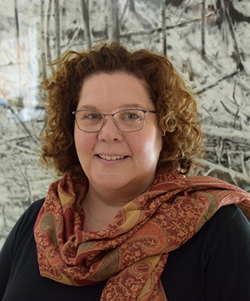

Beth Kane
Norway Memorial Library
Tell us a bit about yourself, the organization you represent, and the work you do.
My name is Beth Kane and I am the library director of the Norway Memorial Library in Norway, Maine. I grew up in this area after my family moved to Maine from Massachusetts when I was in the first grade. After some time away for school and work I returned and married my husband Joel, a former classmate.
Prior to becoming director I worked in reference and information services and adult program planning. I find programming to be one of the most fulfilling parts of the work we do here. We make programming a priority and take inspiration from current events, patron interests, literature and popular culture, local people’s experiences like travel or interesting specialties of work or talent, almost anything.
Tell us about your community/the communities you serve, and your part of the country.
Norway is in western Maine in Oxford County in a region known as the Oxford Hills. We are a bit over an hour northwest of Portland. Norway’s population is just under 5000. We serve people from surrounding towns as well. The school district is made up of nine towns where students attend elementary schools in their home town and then come together for their middle school and school years.
It is a beautiful part of the state that attracts visitors and seasonal residents to its lakes for boating, fishing, swimming or just enjoying lake life; its mountains and trails for hiking, skiing, biking, snowmobiling and ATV riding.
The library is located on Main Street in Norway—one of Maine’s Main Street Communities. There are locally owned shops and restaurants in historical buildings and it’s a very walkable downtown. There is a strong sense of community and a lot happening culturally and creatively. There are artists, writers, performers, and a strong effort to take advantage of and develop sustainable living opportunities. Local history is celebrated while keeping an eye to the future.
What did it mean to you and your community to host the U.S. Poet Laureate?
It was such a delight to be asked to host Tracy K. Smith. I knew it would be a special event and had the sense that it was truly an exceptional day in the history of the library. On its best day, a library can hope to connect people with ideas, experiences, and with each other. This event did all of those things.
The response by the community was swift and people were almost in slight disbelief that is was “the” poet laureate coming. Tickets were spoken for quickly so we made some logistical arrangements to be able to welcome more people than we originally thought would be possible.
It was truly an honor to be a location of “American Conversations”—not only for the library, but for the entire community.
Can you share any feedback you received from event attendees/participants?
People were just happy to be able to be a part of the event. I think we all knew what a special experience it was to be in our own library and listening to Tracy K. Smith read her own work and then talk with us about poetry. We thought about poetry and our own conception what it is or is not. We witnessed how it can help us communicate with each other, step into another’s shoes for a bit, look at the world from a different perspective, and even try someone else’s words to say what we’ve been thinking or feeling but haven’t yet expressed.
Days later people are still telling me how much they enjoyed being able to participate and how they were inspired to continue reading the selections in American Journal or how they rekindled their love of poetry. I imagine for some it inspired a little confidence to pick it up for the first time.
What, if any, type of literary programming do you present in your community? How did this program fit in?
We enjoy opportunities to provide literature-based programs and frequently offer discussion series that focus on a theme. We love to partner with the Maine Humanities Council to offer their “Let’s Talk About It” book discussions. Those discussions are scholar-led and our community responds enthusiastically. The most recent one we offered was titled “Race and Justice in America.” The readings were eye opening, challenging to struggle with, and made for excellent discussion and learning. We also offer some locally developed programs and series and have a monthly morning book club to discuss literary fiction.
This program was a great fit. The poems selected were first read aloud by Ms. Smith and then read a second time by an audience member. Discussion following was interesting and thoughtful and felt very natural. As with book discussions, hearing another person’s thoughts and reactions expands the way everyone else in the room experiences each work. It adds richness and depth that doesn’t happen in isolation.
